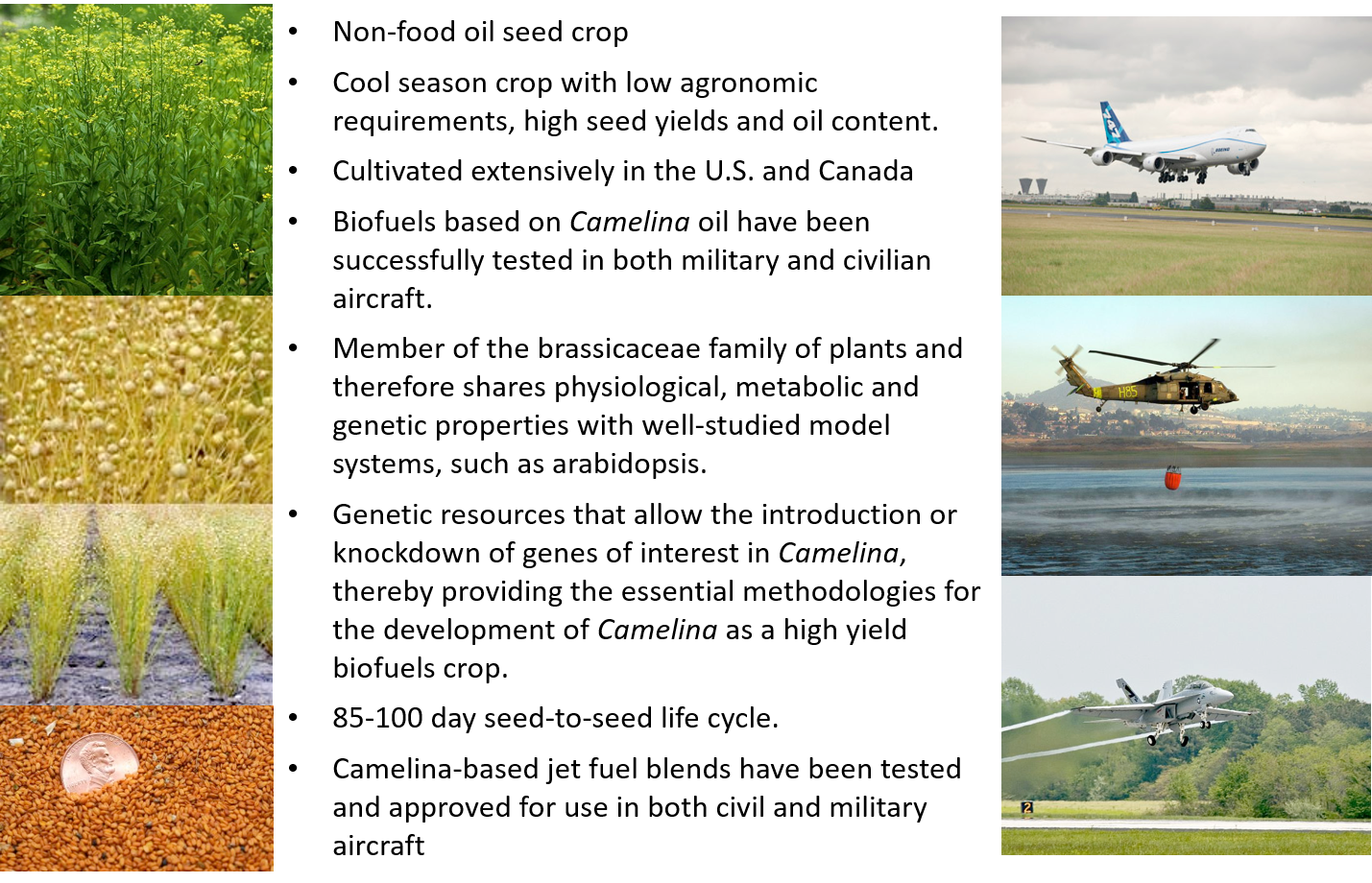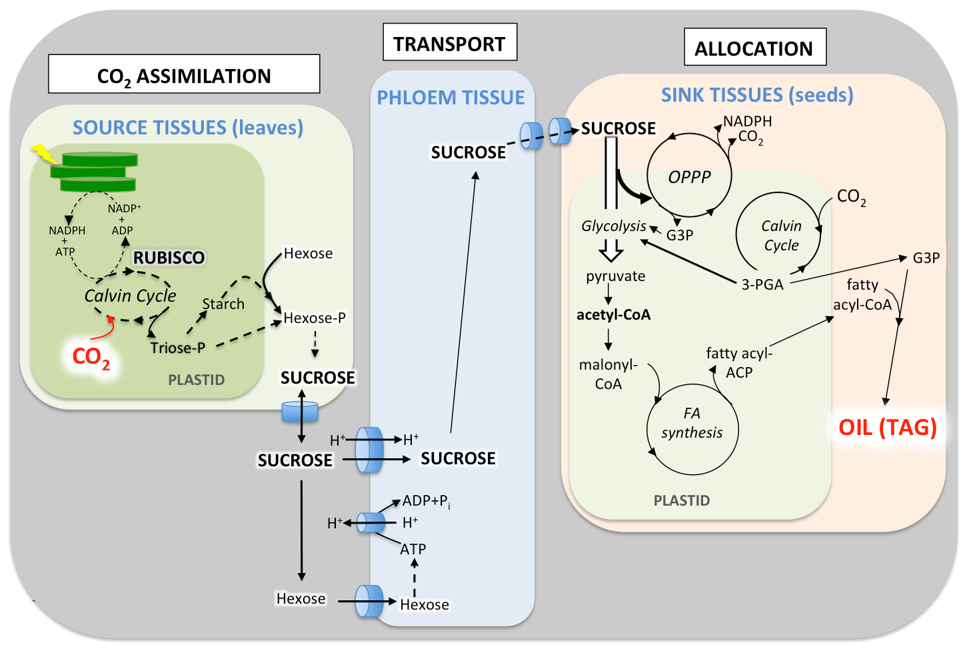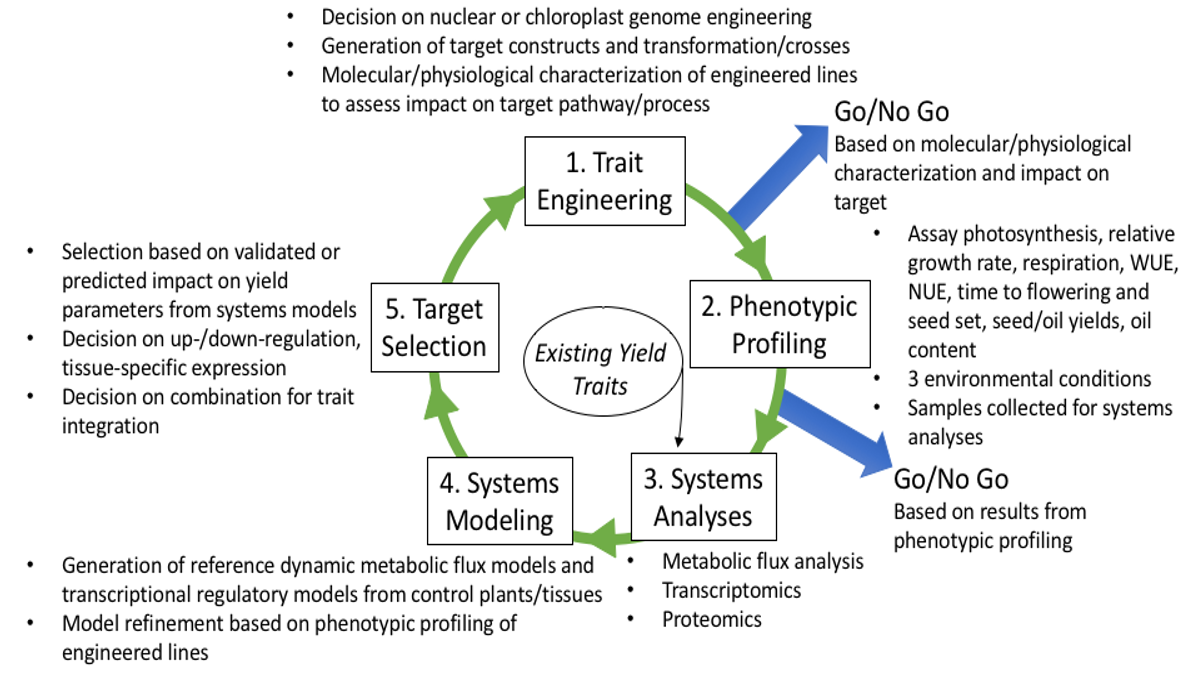GROE
Production in Camelina sativa (DE-SC0018269)
D.J. Schnell, Michigan State University (Principal Investigator)
E. Grotewold, Michigan State University (Co-Investigator)
H. Sederoff, North Carolina State University (Co-Investigator)
Y. Shachar-Hill, Michigan State University (Co-Investigator)
K. Snell, Yield10 Bioscience (Co-Investigator)
Our research plan aims to establish the non-food oilseed crop plant, Camelina sativa, as a commercially viable, dedicated biofuels and bioproducts feedstock. We will focus on improving seed and oil yields by employing an integrated genetic and metabolic systems approach to increase the rates of photosynthetic CO 2 capture and conversion to triacylglycerols (TAGs). Camelina has the advantages of low agronomic inputs and natural resistance to biotic and abiotic stresses relative to other oilseed crops, and Camelina oil-based blends have been tested and approved as liquid transportation fuels. Camelina also benefits as a synthetic biology platform from a fully sequenced genome, well-established molecular genetic tools, and numerous resources available from its close relative, Arabidopsis thaliana. Despite these advantages, the major limitation in widespread adoption of Camelina as an industrial oilseed crop is its modest oil yield. Our proposal will address yield directly by employing a tissue-specific and whole-plant systems approach to identify the major regulatory mechanisms that limit 1) carbon fixation in photosynthetically active source tissues (leaves), 2) the transport of fixed carbon from source to sink tissues (seeds), and 3) the allocation of fixed carbon to TAG production. The limiting factors identified in our analyses will be individually validated and combined using multi-gene stacking and genome editing technologies to engineer Camelina. Our overall objective is to achieve up to a 300% increase per hectare in oil production, thereby meeting the yield and cost targets of a competitive biofuels and bioproducts crop while retaining its advantages for growth in marginal environments.
Our research program builds on the established expertise and collaborative record of the co-PIs to develop an integrated systems-level strategy to accelerate the development of a pipeline of potential yield traits. To this end, we will combine predictive metabolic flux modeling, quantitative proteomics, and the identification of transcriptional regulatory networks with the optimization of multi-gene and genome editing synthetic biology tools to enable the efficient analysis of stacked-traits for improved seed yield and TAG production in Camelina. Newly discovered traits from the co-PI laboratories that positively impact CO 2 capture, transport and allocation will serve as the initial foundation of our strategy by providing immediate candidates for multi-gene transgenic and genome editing approaches to test for additive or synergistic effects on oil yields. These traits will also serve as the platforms for performing tissue-specific and whole-plant metabolic flux and transcriptional regulatory network analyses for the development of dynamic metabolic and gene regulatory models. These predictive models will accelerate the identification of additional metabolic bottlenecks, transcriptional regulators and/or post-translational mechanisms that control seed yields. The control points identified using our systems-level models provide novel targets for engineering and yield analysis individually and in combination with our proven yield traits. Our studies will be guided by an integrated workflow plan for optimized discovery in which output from our predictive, systems-level models inform the selection and analysis of novel trait combinations. Likewise, information from our trait analysis will provide input for the further refinement of our predictive models. This results in a highly integrated and robust research plan that maximizes the potential for achieving our seed and oil yield goals.
Project Specifics
Our research plan aims to establish the non-food oilseed crop plant, Camelina sativa, as a commercially viable, dedicated biofuels and bioproducts feedstock. We will focus on improving seed and oil yields by employing an integrated genetic and metabolic systems approach to increase the rates of photosynthetic CO2 capture and conversion to triacylglycerols (TAGs). Camelina has the advantages of low agronomic inputs and natural resistance to biotic and abiotic stresses relative to other oilseed crops, and Camelina oil-based blends have been tested and approved as liquid transportation fuels. Camelina also benefits as a synthetic biology platform from a fully sequenced genome, well-established molecular genetic tools, and numerous resources available from its close relative, Arabidopsis thaliana. Despite these advantages, the major limitation in widespread adoption of Camelina as an industrial oilseed crop is its modest oil yield. Our proposal will address yield directly by employing a tissue-specific and whole-plant systems approach to identify the major regulatory mechanisms that limit 1) carbon fixation in photosynthetically active source tissues (leaves), 2) the transport of fixed carbon from source to sink tissues (seeds), and 3) the allocation of fixed carbon to TAG production. The limiting factors identified in our analyses will be individually validated and combined using multi-gene stacking and genome editing technologies to engineer Camelina. Our overall objective is to achieve up to a 300% increase per hectare in oil production, thereby meeting the yield and cost targets of a competitive biofuels and bioproducts crop while retaining its advantages for growth in marginal environments.Our research program builds on the established expertise and collaborative record of the co-PIs to develop an integrated systems-level strategy to accelerate the development of a pipeline of potential yield traits. To this end, we will combine predictive metabolic flux modeling, quantitative proteomics, and the identification of transcriptional regulatory networks with the optimization of multi-gene and genome editing synthetic biology tools to enable the efficient analysis of stacked-traits for improved seed yield and TAG production in Camelina. Newly discovered traits from the co-PI laboratories that positively impact CO2 capture, transport and allocation will serve as the initial foundation of our strategy by providing immediate candidates for multi-gene transgenic and genome editing approaches to test for additive or synergistic effects on oil yields. These traits will also serve as the platforms for performing tissue-specific and whole-plant metabolic flux and transcriptional regulatory network analyses for the development of dynamic metabolic and gene regulatory models. These predictive models will accelerate the identification of additional metabolic bottlenecks, transcriptional regulators and/or post-translational mechanisms that control seed yields. The control points identified using our systems-level models provide novel targets for engineering and yield analysis individually and in combination with our proven yield traits. Our studies will be guided by an integrated workflow plan for optimized discovery in which output from our predictive, systems-level models inform the selection and analysis of novel trait combinations. Likewise, information from our trait analysis will provide input for the further refinement of our predictive models. This results in a highly integrated and robust research plan that maximizes the potential for achieving our seed and oil yield goals.
Benefits of Camelina

Project Elements

Workflow Plan

